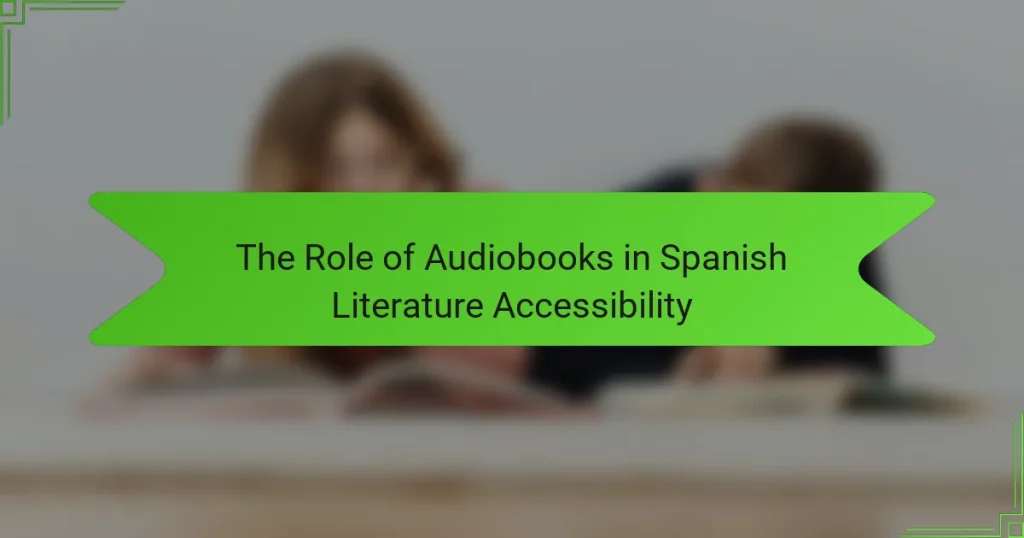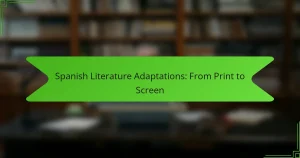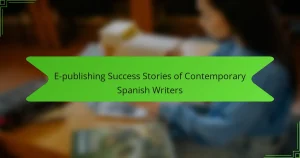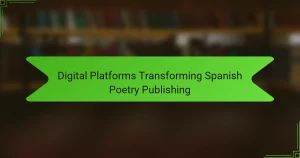Audiobooks enhance accessibility to Spanish literature, catering to diverse audiences including those with visual impairments and non-native speakers. They provide convenient access during daily tasks and foster cultural appreciation. However, challenges such as limited funding and a shortage of skilled narrators hinder production quality. The growing audiobook market is expected to evolve with technological advancements and the rise of diverse voices.
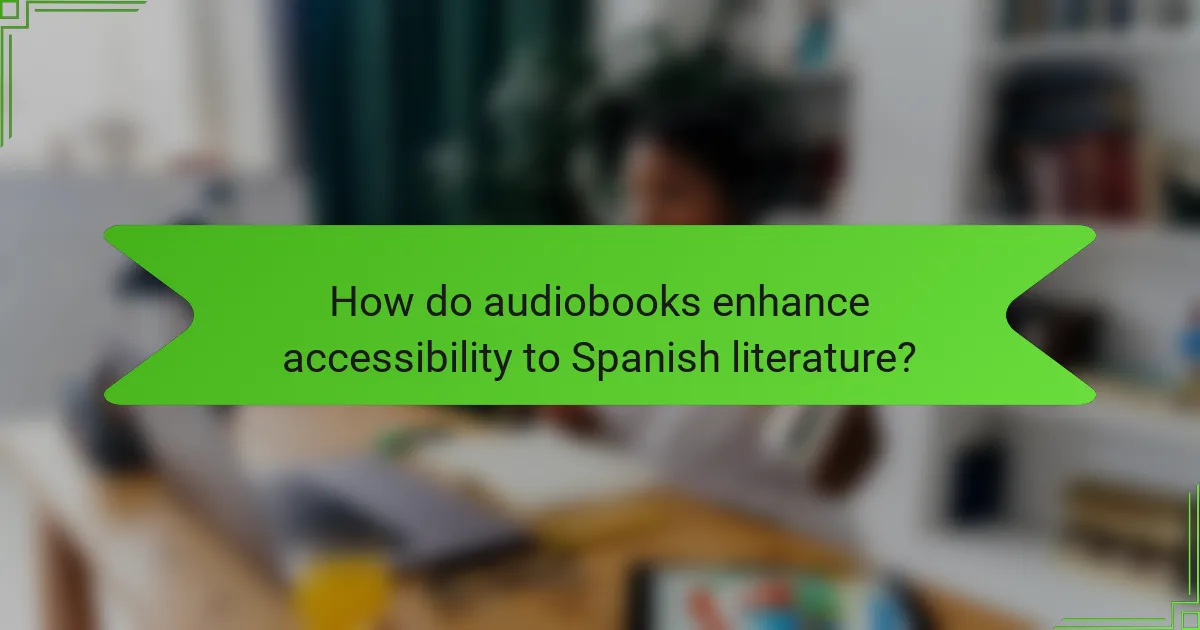
How do audiobooks enhance accessibility to Spanish literature?
Audiobooks significantly enhance accessibility to Spanish literature by providing an inclusive format for diverse audiences. They cater to individuals with visual impairments, learning disabilities, or those who prefer auditory learning. Additionally, audiobooks can bridge language barriers, allowing non-native speakers to engage with Spanish texts through pronunciation and intonation.
The convenience of audiobooks enables on-the-go access, making literature available during commutes or daily tasks. This flexibility encourages increased consumption of Spanish literature. As a result, audiobooks contribute to the preservation and promotion of Spanish literary works, reaching broader audiences and fostering cultural appreciation.
What are the key benefits of audiobooks for Spanish literature enthusiasts?
Audiobooks enhance accessibility to Spanish literature by offering convenience, improving comprehension, and fostering a deeper connection with the text. They allow listeners to engage with works while multitasking, making literature more approachable. Audiobooks can also improve language skills through auditory learning, which is beneficial for both native speakers and learners. Additionally, the emotional delivery by narrators can enrich the experience, bringing characters and stories to life in a unique way.
Which demographics are most impacted by audiobook accessibility?
Audiobook accessibility significantly impacts various demographics, particularly those with visual impairments, learning disabilities, and language barriers. These groups benefit from audiobooks as they provide an alternative means to access literature.
Additionally, older adults often face challenges with traditional print formats, making audiobooks a valuable resource for maintaining engagement with literature. Studies show that approximately 20% of the population may experience difficulties with reading, highlighting the importance of audiobooks in promoting inclusivity in Spanish literature.
Furthermore, younger audiences, especially students learning Spanish as a second language, gain from audiobooks as they enhance comprehension and pronunciation skills. Audiobooks can bridge educational gaps, fostering a love for literature across diverse age groups and abilities.

What platforms are popular for accessing Spanish audiobooks?
Popular platforms for accessing Spanish audiobooks include Audible, Google Play Books, Scribd, and Storytel. These platforms provide extensive libraries featuring various genres and authors, enhancing accessibility to Spanish literature. Audible offers a subscription model with exclusive content, while Google Play Books allows for individual purchases. Scribd combines audiobooks with eBooks and documents, and Storytel specializes in unlimited audiobook streaming. Each platform caters to different preferences, ensuring a wide range of options for listeners.
How do subscription services differ in their offerings for Spanish audiobooks?
Subscription services for Spanish audiobooks vary significantly in their offerings, focusing on diverse genres, exclusive content, and user experience. Some services provide extensive libraries featuring classic and contemporary Spanish literature, while others emphasize curated selections or author-specific collections.
Additionally, features such as offline listening, personalized recommendations, and community engagement differ among platforms. For instance, some services might offer unique attributes like interactive content or author interviews, enhancing the overall literary experience. This variety ensures that users can find a service that aligns with their specific preferences and needs in Spanish literature accessibility.
Which free resources are available for accessing Spanish literature in audiobook format?
Free resources for accessing Spanish literature in audiobook format include platforms like LibriVox, which offers public domain audiobooks, and Audible’s free trials that often feature Spanish titles. Other options are Open Culture, which curates free audiobooks, and YouTube channels dedicated to Spanish literature. These resources enhance accessibility to diverse works in Spanish, promoting literary engagement.
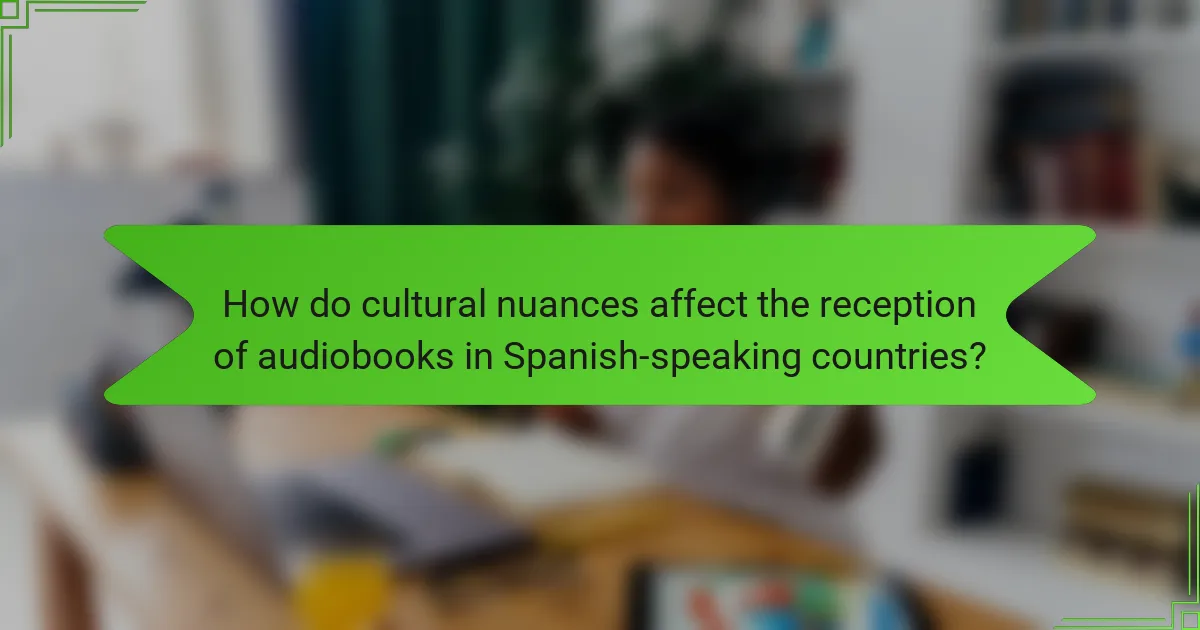
How do cultural nuances affect the reception of audiobooks in Spanish-speaking countries?
Cultural nuances significantly influence the reception of audiobooks in Spanish-speaking countries. Regional dialects, cultural references, and storytelling traditions shape listener preferences. For instance, audiobooks that incorporate local idioms resonate better with audiences. Additionally, the popularity of specific genres varies across countries, affecting market demand. Understanding these cultural elements enhances audiobook accessibility and enjoyment in diverse Spanish-speaking communities.
What role do local narrators play in enhancing the listening experience?
Local narrators significantly enhance the listening experience by adding authenticity and cultural nuance. Their familiar accents and expressions create a deeper connection to the text, enriching the emotional impact. This personal touch fosters engagement, making literature more relatable and accessible to diverse audiences. Local narrators can also convey regional dialects and idioms accurately, preserving the author’s intent and enhancing the storytelling. Overall, their role is vital in bridging the gap between the text and the listener, especially in Spanish literature.
How does regional dialect influence audiobook production in Spanish literature?
Regional dialect significantly influences audiobook production in Spanish literature by affecting pronunciation, intonation, and cultural nuances. This impact enhances listener engagement and comprehension. Different regions have unique linguistic characteristics that shape the way stories are narrated. For instance, a narrator from Spain may interpret a text differently than one from Latin America, reflecting local idioms and expressions. This variation improves accessibility for diverse Spanish-speaking audiences, ensuring that cultural context resonates with listeners. The inclusion of regional dialects also enriches the authenticity of the audiobook experience, making it more relatable and immersive.
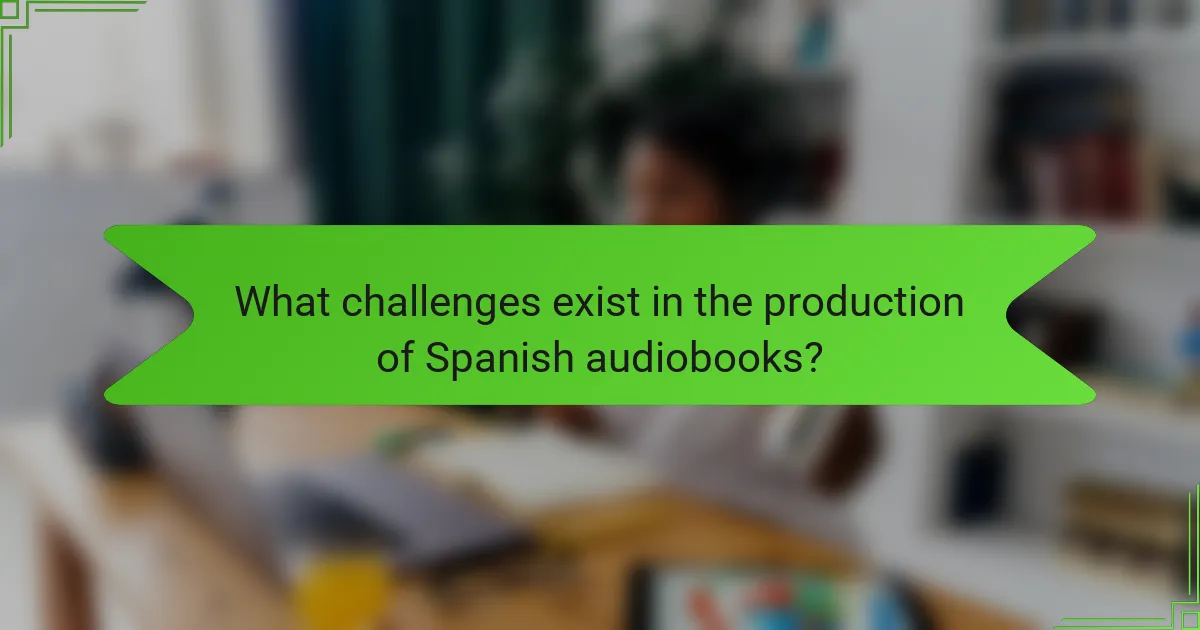
What challenges exist in the production of Spanish audiobooks?
The production of Spanish audiobooks faces several challenges, including limited funding, inadequate technology, and a shortage of skilled narrators. These factors hinder the accessibility of Spanish literature.
Limited funding restricts the ability to produce high-quality recordings. Inadequate technology can lead to poor audio quality, affecting listener experience. Additionally, a shortage of skilled narrators means fewer engaging performances, which can diminish interest in audiobooks.
As a result, these challenges contribute to the overall difficulty in expanding the reach of Spanish literature through audiobooks, impacting both authors and audiences.
Which technical issues are commonly faced by audiobook producers?
Audiobook producers commonly face technical issues such as audio quality control, file format compatibility, and editing challenges. These factors impact the accessibility of Spanish literature through audiobooks.
Audio quality control ensures clarity and consistency, which is essential for listener engagement. File format compatibility can hinder distribution across platforms, affecting audience reach. Editing challenges arise from the need to maintain narrative flow while correcting errors, which can be time-consuming. Addressing these issues is crucial for enhancing the overall experience of audiobooks in Spanish literature.
What are the barriers to entry for new authors in the audiobook space?
New authors face several barriers in the audiobook space, including high production costs, lack of industry connections, and limited marketing resources. These challenges hinder their ability to produce and distribute audiobooks effectively. Additionally, the competitive nature of the market makes it difficult for new voices to gain visibility. Access to professional narration and quality recording facilities can also be a significant hurdle.
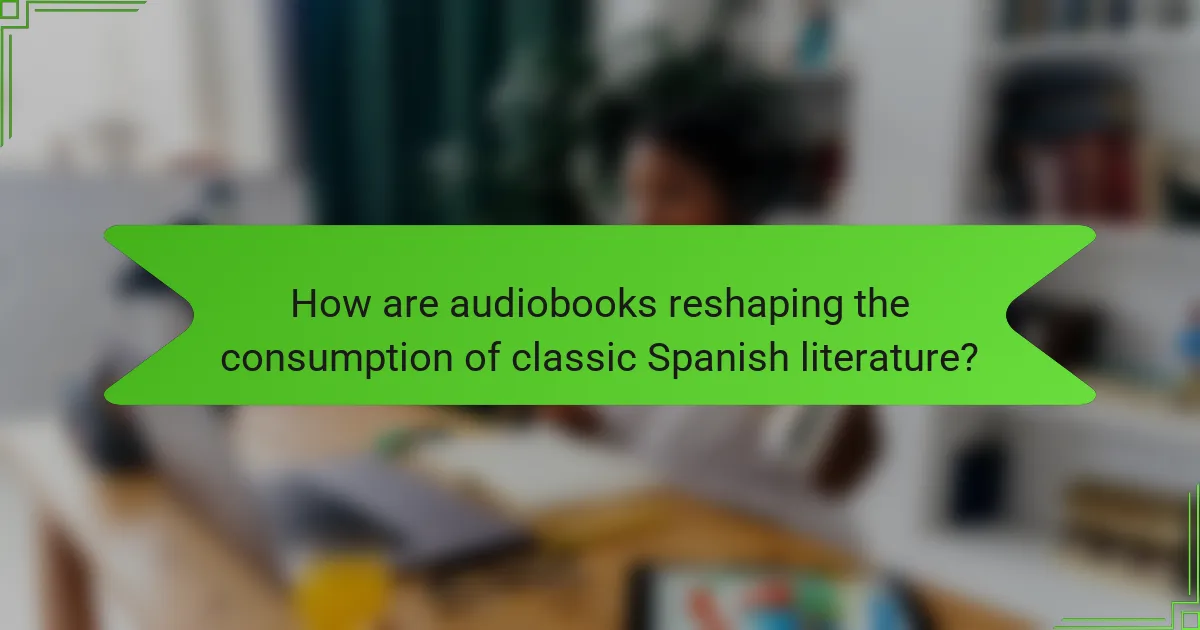
How are audiobooks reshaping the consumption of classic Spanish literature?
Audiobooks are significantly enhancing the accessibility of classic Spanish literature. They allow broader audiences to engage with literary works that may have previously been difficult to access due to language barriers or traditional reading challenges.
Audiobooks offer a unique attribute: they provide an auditory experience that can bring classic texts to life through performance. This immersive quality can deepen understanding and appreciation of the nuances in language, tone, and emotion.
Furthermore, the convenience of audiobooks allows listeners to consume literature during various activities, such as commuting or exercising. This flexibility has led to a rise in the popularity of classic Spanish literature among younger generations who may prefer audio formats over traditional reading.
As a result, the consumption of classic Spanish literature continues to evolve, with audiobooks playing a pivotal role in reshaping how these works are experienced and appreciated.
Which classic works have gained renewed popularity through audiobook formats?
Classic works like “Don Quixote” and “One Hundred Years of Solitude” have gained renewed popularity through audiobook formats. Audiobooks enhance accessibility, allowing diverse audiences to engage with Spanish literature. The immersive experience of listening can attract new readers and enrich understanding of cultural contexts. Audiobooks often feature skilled narrators, adding emotional depth that resonates with listeners. This trend highlights the evolving landscape of literature consumption, bridging traditional texts with modern technology.
How do audiobooks provide new interpretations of traditional Spanish literature?
Audiobooks offer fresh interpretations of traditional Spanish literature by enhancing accessibility and engagement. They bring stories to life through expressive narration, allowing listeners to experience the emotional depth of the text. This medium can reach diverse audiences, including those with visual impairments or reading difficulties.
Additionally, audiobooks often include expert commentary or analysis that enriches understanding. They can present unique cultural insights, making classic works more relatable to modern listeners. By transforming literary experiences, audiobooks foster a renewed appreciation for Spanish literature among new generations.
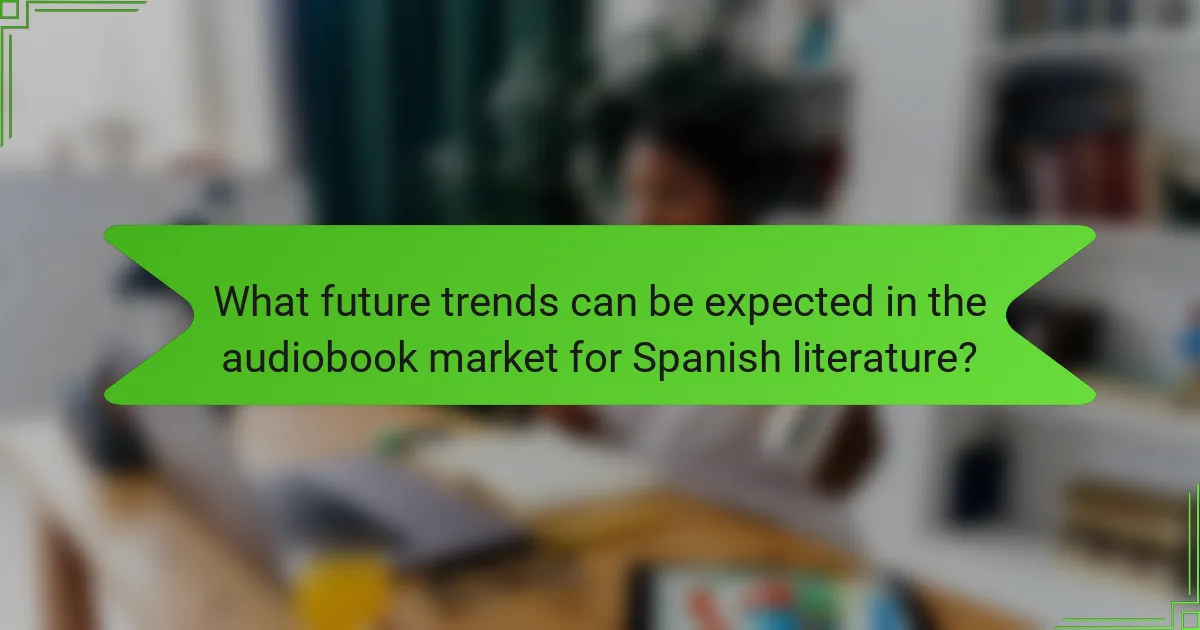
What future trends can be expected in the audiobook market for Spanish literature?
The audiobook market for Spanish literature is expected to grow significantly, driven by increased accessibility and technological advancements. Emerging trends include the rise of diverse voices, enhanced production quality, and personalized listening experiences. The integration of AI for narration and recommendations will further shape this landscape. Additionally, the expansion of platforms catering specifically to Spanish-speaking audiences will enhance availability and reach.
How is technology influencing the evolution of audiobooks in Spanish literature?
Technology is enhancing the accessibility of audiobooks in Spanish literature. Digital platforms allow wider distribution, making literary works more reachable. Innovations like text-to-speech and immersive audio experiences cater to diverse audiences, including those with visual impairments. Additionally, the growth of subscription services has increased the availability of Spanish audiobooks, promoting cultural engagement. As a result, technology is transforming how Spanish literature is consumed, ensuring it reaches a broader demographic.
What innovations are emerging in the audiobook production process?
Innovations in audiobook production are enhancing accessibility in Spanish literature. Advances like AI voice synthesis, improved sound engineering, and interactive narration are making audiobooks more engaging and inclusive. These technologies enable diverse dialects and accents, enriching the listening experience for a broader audience. Additionally, integration with digital platforms facilitates easier access to Spanish literature, promoting cultural exchange and understanding.
What best practices should creators follow when producing Spanish audiobooks?
Creators should prioritize clear narration, cultural authenticity, and high audio quality when producing Spanish audiobooks. These practices enhance accessibility and engagement for diverse audiences.
1. Invest in professional narration to ensure clarity and emotional resonance.
2. Incorporate cultural nuances to connect with the target audience.
3. Use high-quality recording equipment to enhance audio clarity.
4. Edit thoroughly to remove distractions and improve flow.
5. Provide supplementary materials, like transcripts, to support comprehension.
6. Seek feedback from native speakers to refine the final product.
